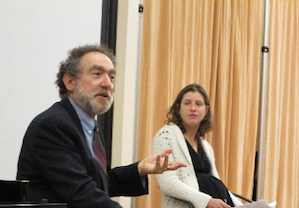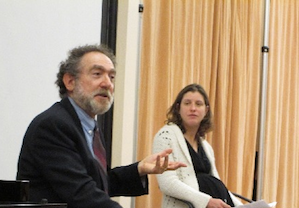
Photos by Janos Gereben
Who were these people in the San Francisco Opera's Chorus Room last week, waving pencils in the air and LOvL — laughing out (very) loud?
What were those black-and-white videos made in-house featuring close-ups and barely perceptible, but important differences between Donald Runnicles, Nicola Luisotti, and other conductors leading the same music?
Would non-musicians have the gumption to conduct music? (Yes they did, "My Country, 'Tis of Thee," not Wagner.)
Conducted — ahem — by Jonathan Khuner, this was a conducting workshop for nonprofessionals, a.k.a. opera fans, who are brought inside the process of producing opera to engage, share, and learn, as a part of the company's huge educational outreach.
The event, one in the Overture series, had some 80 "civilians" pay $25 each to delve in the innermost mysteries of what an opera conductor does. Learning, participating, enjoying, and becoming insiders, they spent some money, and a couple of intense, eventful, and insightful hours, well.
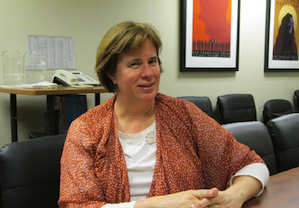
Another result: 80 new fans for Khuner, who is one of the most skilled, experienced, and supportive musicians around. The music director of West Edge Opera, assistant conductor and prompter for the San Francisco Opera (for 33 years), the Metropolitan Opera, and other major opera houses (even the Bayreuth Wagner Festival), Khuner led the workshop with clarity, gusto, and great good humor.
The session consisted of an in-depth Q&A about the work of conductors between Khuner and SFO assistant director of education Dolores DeStefano; with Khuner explaining videos of performances as seen in the prompter's box ("watch Luisotti take an extra breath here ..."); a conducting excercise with soprano Siobhan Raupach, accompanied by Darryl Cooper; and then individuals and the whole group go through the motions (in a good sense) of conducting.
Selling, marketing, advertising, cajoling, and so on are the traditional ways of trying to bring new audiences (and hold on to current ones) into the War Memorial. The San Francisco Opera has been sharpening an additional, very attractive, arrow in its quiver.
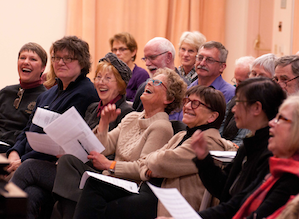
It's the Education Department, reaching out to the community with a variety of programs — for schools, families, adults — to entertain and educate, and build audiences. Youth programs, involving some 50,000 children from throughout Northern California visiting the War Memorial for dress rehearsals and special performance, as well as artists going to schools, are well known.
Ruth Nott, director of education, started the department in 2008, named to the post by General Director David Gockley; previously, Nott served as director of programs at the Metropolitan Opera Guild.
Gockley says: "It's a big priority for us to get people together to foster a deeper understanding of opera in its various aspects. A knowledgeable public is a loyal public. Ruth and Dolores have done a great job choosing the topics for the Overtures program. The result is that it's growing in popularity and attendance."
Nott speaks enthusiastically about a relatively little-known part of the department's activities: the Overture Opera Workshops for Adults, a program of four classes, coinciding with SFO seasons in the fall and summer. The next series will take place on four consecutive Monday evenings, June 9-30, during the SFO summer season.
Individual classes are $25, but signing up for all four classes costs $80. (Khuner's conducting workshop is a stand-alone part of Overture.) Nott describes the classes as dealing with "the importance of the story, how the text changes from novels, films, etc. into the libretto"; the work of the musicians — singers and instrumentalists; the stage director; and production elements: sets, props, lights, make-up, wigs, costumes.
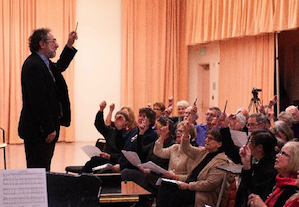
From the experience of previous workshop participants:
* "It was so much fun that after the four sessions were over, we were lost about what to do on Monday nights."
* "This was a terrific experience. It was filled with surprises and new notions of opera as a unique art form."
* "I've been a season ticket holder for many years. The operas I saw subsequent to class were much enriched. I can't wait to see Tosca next week even though I have seen it at SFO before!"
* "Knowing the work that goes behind the scenes only increased the magic."
* "Would go again in a heartbeat..."
Nott describes an unusual portion of the first class: Participants meet in small groups to come up with stories for an opera while professional composers walk around, observing and eavesdropping. They go off to a practice room, and come back in 15 minutes with scores written on the drafts as the libretto, and they perform them. Must be be both a surprise (perhaps spoiled here, sorry) and great fun.
Both Nott and Khuner talk about "dispelling the mystique," giving the general public an opportunity to learn more about the reality of producing opera. "I come to the opera," Nott says of many in the audience, "but I don't know how you do that, I see only the singers and orchestra. Is there more to it?" Yes, and that's the gap the Education Department is aiming to fill. Khuner has an additional, rather complex point to make:
The main problem we have with the arts is that they are becoming more and more commercialized. It's more about selling a product and less about sharing — what Wagner always talked about — sharing something. These workshops are part of the sharing.
It's important that people treat arts as something you can do every day. You couldn't do this a hundred years ago, but now you can hear four operas every day, on YouTube, etc. It's all taken for granted and put on a very high pedestal at the same time. With these workshops, we bring audiences inside the process.
Previously to Khuner's current "Follow the Leader: the Role of the Conductor" event, first offered in 2011, and now repeated, these are some of the previous workshops:
* "From the Page to the Stage: Creating New Operas," Jake Heggie (spring 2011) and Tobias Picker (fall 2013)
* "All Together Now: Sing with the San Francisco Opera Chorus" (spring 2011, spring 2013)
* "Masters of Illusion: The Wig and Makeup Department" (fall 2012)
* "Behind the Curtain: Planning a San Francisco Opera Season" (spring 2013)

